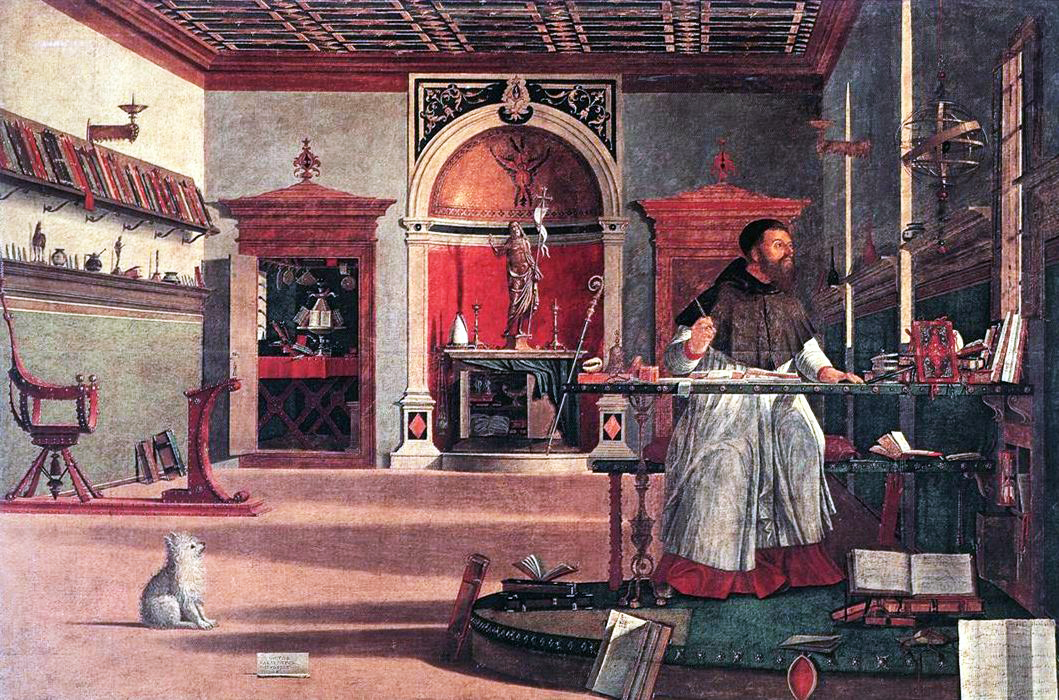Sant’Agostino nello studio by Vittore Carpaccio (1502)
‘Genius in all fields of Christian doctrine’
[Augustine] often dictated at the same time discussions to several writings: 93 works or 232 ‘books’, he says in the year 427 in his Retractationes (which critically contemplate, so to speak, his work in chronological succession), to which we must add the production of his last years of life, in addition to hundreds of letters and sermons, with which he ‘almost always’ felt dissatisfied.
The intellectual production of Augustine was overrated, particularly from the Catholic side. ‘An intellectual giant like him, only the world offers it once every thousand years’ (Görlich). Maybe from the Catholic world! However, what he calls ‘intellectual stature’ is what serves him, and what serves him is detrimental to the world.
Augustine’s existence precisely reveals it drastically. However, J.R. Palangue praises him as ‘a genius in all fields of Christian doctrine’. And Daniel-Rops goes on to say: ‘If the word genius has any meaning, it is precisely here. Of all the gifts of the spirit that can be fixed analytically, none was missing; he had all, even those that are generally considered mutually exclusive’. Who is startled by such nonsense is called malevolent, malicious, ‘a creeping soul’ (Marrou). However, even the father of the Church Jerome, although out of envy, called his colleague ‘a little latecomer’. In the 20th century, the Catholic Schmaus flatly denies Augustine’s genius as a thinker.
The thought of Augustine? It is totally dominated by ideas of God, partly numbed by euphoria, partly terrified. His philosophy is, basically, theology. From an ontological point of view, it is based on hypotheses without any foundation. And there is a multitude of painful absences.
Augustine, whom Palangue praises saying: ‘With a flap he rises above any superficial objection’ usually is a prodigy of superficiality. Also the ‘professional orator’ of yesteryear (and today!) cheats through rhetorical tricks. He contradicts himself, especially in The City of God, a work with a strong influence of Arnobius that appeared between 413 and 426, his ‘magnum opus’ as he says, where he sometimes equates and others clearly differentiates his own fundamental concepts: ‘Roman Empire’ and ‘Diabolic State’. Or ‘Church’ and ‘God’s State’.
When he was a young Christian, he believed that miracles no longer occur, so that ‘no one is raised from the dead anymore’; when he gets old he believes otherwise. Already in 412 he had the idea of ‘collecting and showing everything that is rightly censured in my books’. And so, three years before his death he begins, since everything was ‘altered’, a complete book with rectifications, Retractationes, without really ‘rectifying’ everything. In any case, he introduced 220 corrections.
However, as many times as Augustine ‘rectified’ something, he refuted others’ work, placing the heading of many of his writings a ‘Contra […]’.
At the end of the 4th century he attacked the Manichaeans: Fortunatus, Adeimantus, Faust, Felix, Secundinus, as well as, in another series of books, Manichaeism: of which he himself was formally a follower for almost a decade, from 373 to 382, although as ‘listener’ (auditor), not as an electus. In three books Against Academics (386) he confronts scepticism. From the year 400 on he criticises Donatism; from 412 Pelagianism, and from 426 semi-Pelagianism. But next to these main objectives of his struggle, he also attacks with greater or lesser intensity the pagans, the Jews, the Arians, the astrologers, the Priscillians and the Apollinarians. ‘All the heretics hate you’ he praises his old rival Jerome, ‘just as they persecute me with the same hatred’.
More than half of Augustine’s writings are apologetics or have a controversial character. On the other hand, while, being a bishop, in thirty years he only once visited Mauritania, the less civilized province, he travelled thirty-three times to the incredibly rich Carthage, where, apparently as compensation for his modest convent diet, he liked copious lunches (for example roasted peacock); talk to important people and spend whole months with colleagues in hectic activity. The bishops already lived near the authorities and in the court, and were themselves courtiers; Augustine’s friend, Bishop Alypius, was arguing in Rome until the saint’s death.
Peter Brown, one of the most recent biographers of the leading theologian, writes: ‘Augustine was the son of a violent father and an inflexible mother. He could cling to what he considered objective truth with the remarkable ingenuity of his quarrelsome character’.
It should be noted that the increasingly violent aggression of Augustine, as manifested in his dispute with the Donatists, could also be a consequence of his prolonged asceticism. Before, as he himself confessed, he had had remarkable vital needs, ‘in lewdness and in prostitution’ he had ‘spent his strength’, and later he had energetically conjured ‘the tingling of desire’. He lived a long time in concubinage, later he took a girl as a girlfriend (she had almost two years to reach the legal age to get married: in girls twelve years) and at the same time a new darling. But for the cleric sexual pleasure is ‘monstrous’, ‘diabolical’, ‘disease’, ‘madness’, ‘rottenness’, ‘nauseating pus’, and so on.
Apart from that, was not he also feeling guilty about his long-time companion, whom he had forced to separate from himself and his son?
______ 卐 ______
Liked it? Take a second to support The West’s Darkest Hour.

2 replies on “Kriminalgeschichte, 66”
So Xtian WNsts criticise Mahomet for deflowering a 9-year old girl but not a Big Father of their fucking Church?
No, and undoubtedly they’d find a multitude of ways to apologize for his actions.